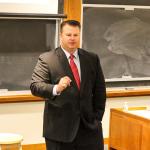Menu
Vice President of Operations at Lightlife on How to Effect Positive Change
January 31, 2017
“My operations management training at UMass has allowed me to rapidly work through scenarios in real time. Operations, sales, marketing—everything’s intertwined,” emphasized Bill Russell ’96 in a visi

The Isenberg alumnus began by recalling his role in driving process improvement at his former employer, Frito-Lay. During a visit to a Frito-Lay plant that was idle for the weekend, Bill observed a perpetual, nitrogen-generating system that he determined was leaking. “Why was it running when the plant was down? Was it necessary? safe? expensive?” he asked. “You have to ask these questions and have these conversations, but in the right way,” he told the students. The upshot: the plant fixed the leaks and introduced an improved tracking system and processes that saved it $60,000 per annum. Bill subsequently jetted around the country setting up “nitrogen teams” that saved Frito-Lay $2 million.
You Say Potatoes
Russell also led Frito-Lay in rethinking its supply chain for the potatoes that wind up in its chips. Before his intervention, the company’s New England factories, including its plant and distribution center in Killingly, Connecticut, had sourced potatoes via truck from Florida. That was counterproductive, he said, because potatoes can deteriorate in transit. “You can store them, but if you move them—they don’t like that,” he told the students.” When a truck breaks down and takes on water, in fact, “they can arrive as potato soup,” he remarked. What’s more, freshness, he added, facilitates peeling. When potatoes are fresh, “you can take the peel right off [without damage]. And with the wrong set up, you will lose 30,000 of them.” After running quality, cost, and other numbers, Russell’s solution and ultimately Frito-Lay’s was for the company’s New England operations to source their potatoes from Maine.
I’ll put us [Isenberg OIM graduates] up against alumni from leading business schools any day of the week.“Any time you try to change things, you should expect pushback,” Bill continued. To effect positive change, “you have to bridge that gap and explain why.” That, he emphasized, entails painstaking modeling of critical variables and understanding where people are coming from. Ultimately, you need to effect positive returns on investment. And when you do implement change, you should track and evaluate it.
Facility with data analytics, Russell added, can also help you to gain the upper hand with suppliers and other players. After a supplier/sales rep ticked off his own rising costs in a meeting with Russell, the Isenberg graduate braced himself for proposed price hikes from the salesman. When the two met again, Russell, having done his analytics homework, persuasively countered every cost-increase argument. The vendor’s response: “For you, we’ll keep prices flat this year.”
“Your training here in operations management will allow you to manage all sorts of competing priorities,” Bill told the students. “Everything is related—new product development, engineering, finance, marketing initiatives, human resources. I’ll put us [Isenberg OIM graduates] up against alumni from leading business schools any day of the week. Just remember to ask why and keep asking until it makes sense. If something doesn’t make sense, then change it!”